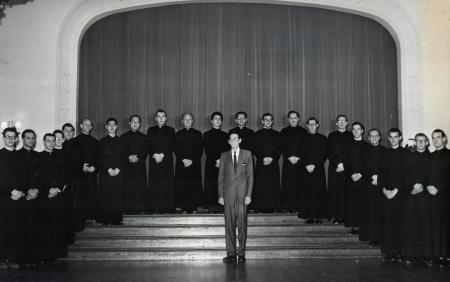On this Feast of Holy Transfiguration, St. Vladimir’s Seminary remembers the eminent Orthodox Church musician and noted Professor Boris Ledkovsky, on the 50th anniversary of his repose in the Lord (+Aug. 6, 1975).
Boris Ledkovsky was born in 1894 in Agrafenovka, Russia. The son of a priest, Boris began directing a church choir from the age of 14. Ledkovsky founded and directed various choirs in Europe (France and Germany) before arriving in America in 1951 with his wife and children. He joined St. Vladimir's Seminary faculty in 1953 and served as its choir director in the early years, when the Seminary was still located on 121st Street in New York City.

Professor Ledkovsky became one of the most influential Orthodox Church musicians of the twentieth century, playing a key role in changing the style of singing in North American Orthodox churches. In his compositions, Ledkovsky attempted to convey what he so often referred to as “tserkovnost” (i.e., churchly), drawing inspiration from the old Russian chants. He emphasized the importance of the text—and that the music should never predominate over it—and composed music in service of the sacred words sung in liturgical settings. One of his students, David Drillock—who would go on serve for many years himself as the Seminary's Professor of Liturgical Music—recalled, “I became very close to Professor Ledkovsky and can remember so vividly how, when I would excitedly show him some piece of music that I had heard and was asking him why we shouldn’t sing it, he would look at me, shake his head, and simply reply, ‘Ny, David, eto ne tserkovno’ (But, David, this is not churchly).”
Under Ledkovsky's direction, the St. Vladimir's Seminary Male Choir achieved such a high level that the choir gave several public concerts in the late 1950s and early 1960s. In 1961 the first recording by the Seminary choir was produced. Boris Ledkovsky directed and, for the most part, the selections were settings of chant done by Ledkovsky along with a few of his own compositions. Drillock described the transformation that the work of Ledkovsky and others helped set in motion during those years throughout the Church in North America:
Already as a result of the annual Lenten visits to parishes on the east coast and the annual concerts which we gave in New York City, and especially by the lectures given by Fr. Alexander [Schmemann] throughout the entire country in churches and college campuses, an awareness that liturgical worship and church singing were not only vestiges of an “ancient, colorful rite” but something that was relevant and meaningful to contemporary life was beginning to take hold.
Then, in 1964 a recording of the Divine Liturgy in English with Prof. Ledkovsky directing was made. The choir was recognized, as one reviewer for The New York Times put it, as “almost a professional chorus,” and among church people it was known not only for its “prayerful” renditions of church music but also as the choir most responsible in America for arousing interest in the ancient liturgical chants of the Russian Orthodox Church.
(Although that 1964 album is no longer in publication, the recording has been posted online. Other recorded compositions and arrangements of Ledkovsky's may be downloaded via Musica Russica.)
Toward the end of his life, Professor Ledkovsky’s work at St. Vladimir’s Seminary was limited to one rehearsal a week, though he also continued to compose music for the choir, which Professor Drillock would adapt to English. Ledkovsky was commissioned by the Seminary to write a Vespers, which in turn was adapted for English and published by St. Vladimir’s Seminary in 1976. Professor Ledkovsky never saw the published work, as he died in 1975 after battling lung cancer.
His beloved wife, Marina Viktorovna Ledkovsky, whom he married in 1943, was a pioneering scholar of Russian women’s studies. She was appointed full professor jointly at Barnard College and Columbia University in 1979 and remained there until her retirement in 1996. She fell asleep in the Lord in 2014. Boris and Marina had four children: Alexander (also a noted church musician), Dimitri, Tatiana, and Michael.
Over the coming academic year, to commemorate 50 years since his falling asleep, the Seminary's liturgical music curriculum and programs, led by The Rev. Dn. Dr. Harrison Russin and Zachariah Mandell, will pay special tribute to Boris Ledkovsky's prolific career and contributions.
May the memory of Professor Boris Ledkovsky be eternal!
St. Vladimir's Seminary Faculty in 1958 at Union Theological Seminary in New York: back row (left to right): Boris Ledkovsky, Fr. Paul Schneirla, Veselin Kesich, Archimandrite Firmilian (Ocokoljić), Nicholas Ozerov; front row: Sophie Koulomzin, Alexander Bogolepov, Fr. Alexander Schmemann, Nicholas Arseniev, Serge Verhovskoy.
More about the work of Ledkovsky, other noted figures, and significant historical events in North American Orthodox liturgical music may be found in Professor Drillock’s “My Life in Church Music.”